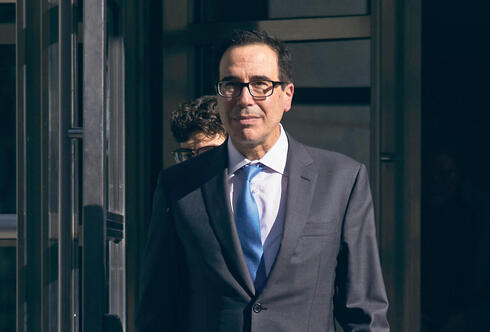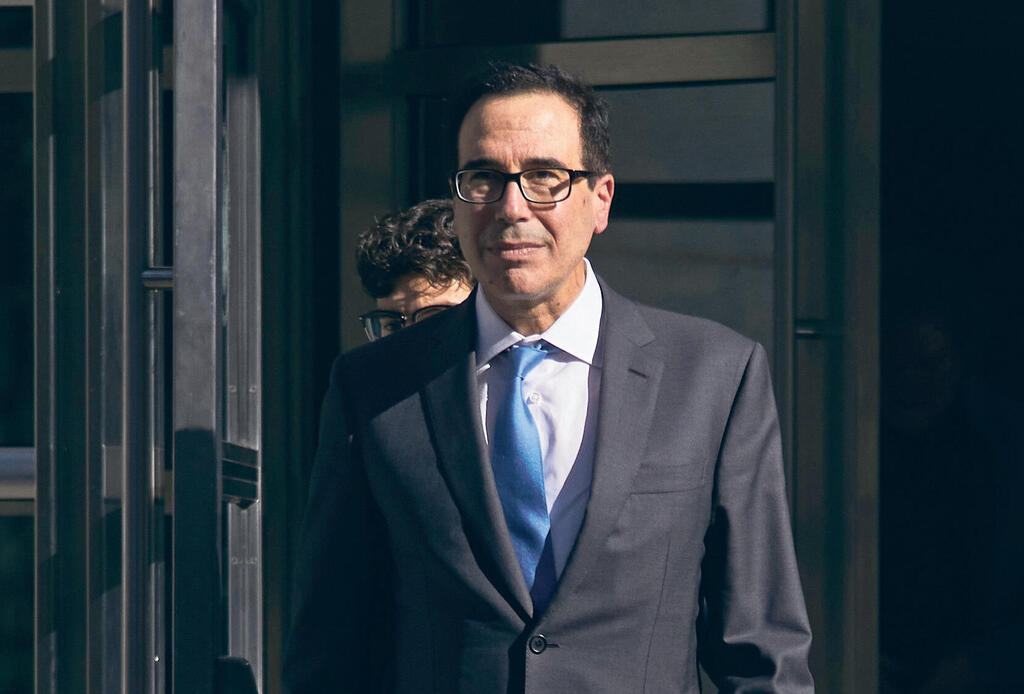
Steve Mnuchin: “We're looking at some very large significant investment opportunities in Israel”
Despite the ongoing war, the former U.S. Secretary of the Treasury, who visited Israel last week, remains optimistic regarding the outlook of the local economy and its high-tech sector
“No matter how much you know or hear about this or read about this, seeing it in person was a very different experience. But I'd say there's much more of a sense of normalcy here than I expected. We’ve seen the shekel rebound, and we've seen the Stock Exchange rebound, so we're confident in the long term growth and the long term opportunity. We continue to think there'll be great technologies that come out of Israel,” Steve Mnuchin, former U.S. Secretary of the Treasury, who served under President Donald Trump's administration, told Calcalist in an exclusive interview.
The interview took place during Mnuchin’s brief visit to Israel last week alongside David Friedman, former U.S. Ambassador to Israel. Mnuchin (61) had a lengthy career on Wall Street, holding senior positions in various investment banks, most recently at Goldman Sachs, before joining politics under Trump. Following the conclusion of the political chapter, which could resume after the November elections, the seasoned financier used his new political experience to establish an investment fund named Liberty Capital.
The objective was to connect the wealth of the Gulf and the U.S. to Israeli high-tech and beyond. However, when Mnuchin raised $3 billion for the new investment fund in 2021, the Middle East landscape seemed very different from its current state. The Abraham Accords, normalizing relations between the United Arab Emirates and Israel, had only recently been signed, and a similar agreement with Saudi Arabia seemed imminent. The fund, co-founded by Ambassador Friedman, aimed to foster closer ties through Saudi and Emirati investments in Israeli high-tech. According to reports, Mnuchin and Friedman, among others, attracted investments from the sovereign fund of Saudi Arabia (PIF), as well as Mubadala, the wealth fund of Abu Dhabi.
Since its inception, the fund has invested $850 million in two Israeli cyber companies, Cybereason and BlueVoyant, and acquired Zimperium, founded by Israelis. However, since mid-2022, the fund has not announced any new investments in Israeli high-tech.
The recent visit by Mnuchin and Friedman consisted of a series of business meetings, some with high-tech entrepreneurs, and meetings with senior political leaders in Israel. These included the Speaker of the Knesset, Amir Ohana, President Isaac Herzog, Minister of Defense, Yoav Galant, and Prime Minister Benjamin Netanyahu, who all made time in their busy schedules to meet with Mnuchin, who could potentially be back in the White House in a year. Additionally, Mnuchin visited Kfar Aza, which was attacked by Hamas terrorists on October 7, but he emphasized that the primary purpose of the visit was to express his belief in the Israeli economy and commitment to continue investing through Liberty Capital, which, in the last year and a half, has not actively invested in Israel.
It seems that foreign investors are currently a little concerned about investing in Israel. Isn’t it currently easier to justify investing in an American cyber company?
“The initial reaction at the beginning of the war was: stop, and you saw the stock market drop significantly as well as the shekel. However, we've seen both return to normal levels in the past month. We have a long-term view, positive views on the economy here and we're looking at some very large significant investment opportunities. Despite what's going on with the war, we believe in the Israeli economy and the opportunities going forward.”
And what about the global geopolitical situation? How are you dealing with this new situation? Are the Saudis still interested in investing in Israeli high-tech?
“We have a very diverse set of global investors. We do have sovereign wealth funds in the fund, but we also have family offices and insurance companies. I can't comment on specific investors in the fund.”
Can you mention some of the companies you met during your visit?
“No, obviously I can't because we're actively looking at different situations and I wouldn't comment, but some of the technology is interesting. There's one company that we started looking at a year ago that is a defense related company and the technology has progressed significantly. It's actually something that's being utilized in the IDF now. So that's something that we're actively looking at and there are a bunch of other big opportunities.”
Nevertheless, your biggest investment to date in Israeli cyber company Cybereason has been very disappointing so far. After leading a $275 million round at a $3.4 billion valuation in 2021, the company was recently valued at only $300 million in an investment made by SoftBank. Doesn’t that deter you from making additional investments?
“Well, you know the fundamental thesis of our investment was we really believed in the technology. Obviously, cybersecurity is a big opportunity. As we look at the technology, we think it's great technology and we think there's terrific opportunities and you know the company has a big local presence here that we support.”
Would you consider making another investment in Cybereason?
“We always consider follow-on investments. if the company has acquisitions, we'll definitely look at that opportunity.”
How many investments do you think you will make here in Israel in 2024?
“I would say over the course of the year we'll probably make four or five new investments and we could easily see one or two of them being in Israel.”
And what is the average check you're writing from this $3 billion fund?
“We tend to look at larger investments, but in Israel we're willing to do things that are on the smaller side as well.”
As a former Treasury Secretary, what measures do you think that Israel should take in order to prevent economic disaster if the war continues? As of now the cost of the war is estimated at NIS 200 billion.
“To me there are two important issues. One is that the war doesn't expand, that right now things appear stable in the north, at least more stable. It's important to start getting people back to work and getting to a lower number of reserves.”
What fiscal or monetary measures would you advise as an economist?
“In the short term, obviously supporting the economy is very important. I'm sure there'll be increased defense spending and that will be helpful to the economy, particularly on the domestic side. Clearly, there'll be certain incentive programs that are created to get people back to work. I think in the short term Israel is going to run a deficit. The good news is that Israel's debt to GDP is very sustainable.”
What would be different in the relations between the U.S. and Israel if you were still in the White House with Trump?
“I think the good news is that this administration has been very supportive of Israel recently in the war. President Trump and the ambassador have a great track record and we're proud of what we accomplished here. So everything from moving the embassy to Jerusalem and working together on the sanctions regime to the Abraham Accords, there's a lot of things we're very proud of.”
Are you actively involved in the fund now or more focused on the elections in November?
“I'm actively involved in the fund, that's what we're all focused on. Obviously, as we come here we're going to have some political meetings and we obviously have views, but our focus is on the fund.”















